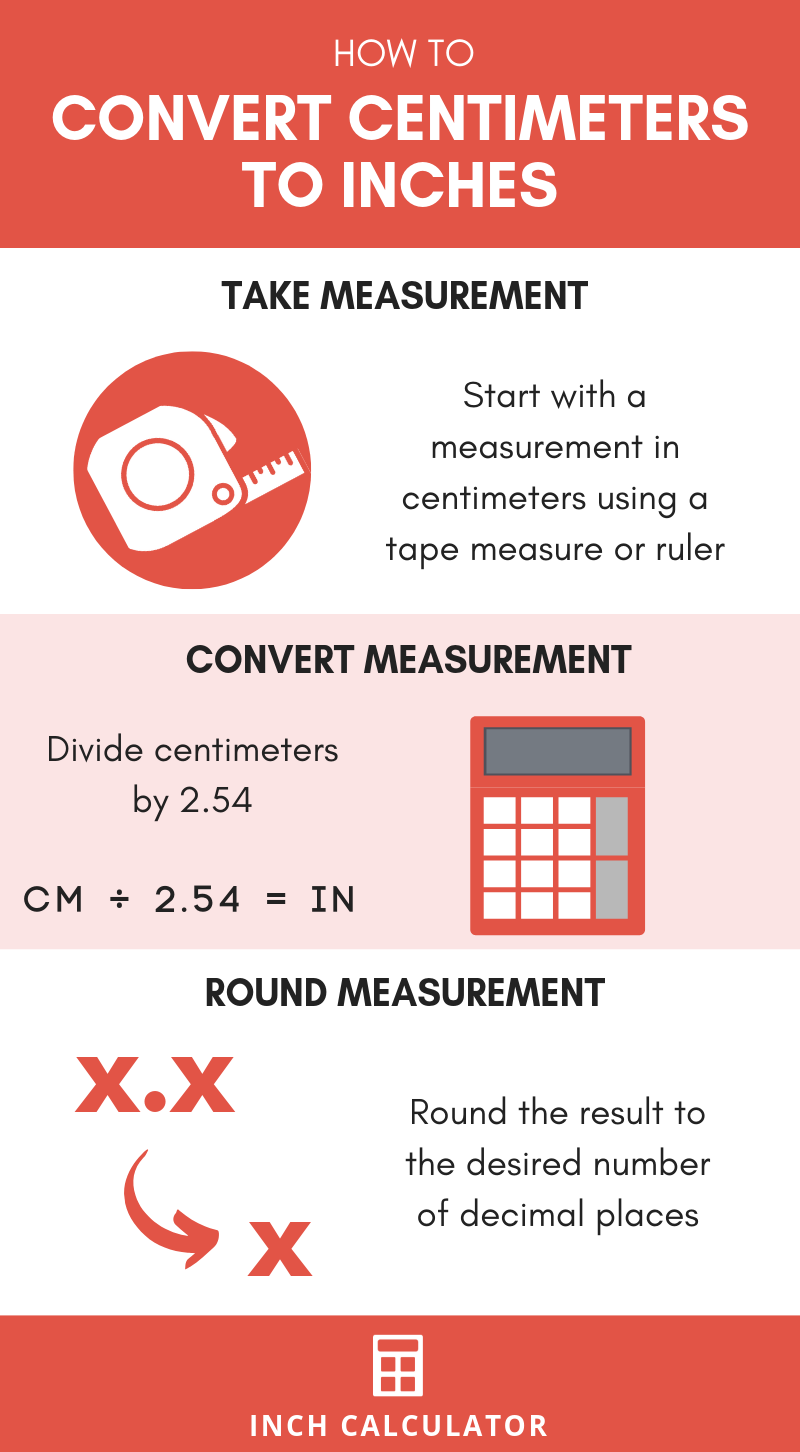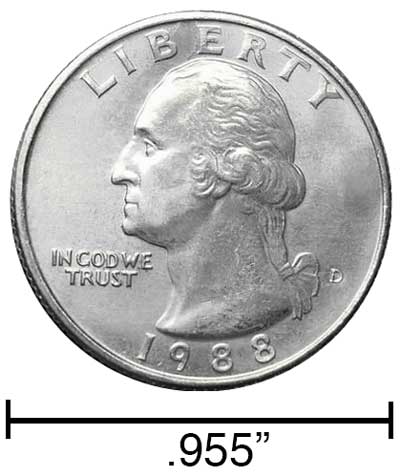how many 34-centimeter cubes do you need to create a cube with an edge length of 12 centimeters?
Centimeters to Inches Conversion Calculator
Enter the length in centimeters below to get the value converted to inches.
Results in Inches:
1 cm = 0.393701 in
1 cm ≈ 25/64"
How to Convert Centimeters to Inches
To convert a centimeter measurement to an inch measurement, use a simple formula. Since one inch is equal to 2.54 centimeters, this formula can be used to convert:
inches = centimeters ÷ 2.54
The length in inches is equal to centimeters divided by 2.54.
For example, here's how to convert 5 centimeters to inches using the formula above.
5 cm = (5 ÷ 2.54) = 1.968504"

How to Convert cm to Fractional Inches
We covered how to convert centimeters to inches, but you may still be wondering how to convert cm to fractional inches.
Begin with the cm to inches conversion above to get the resulting decimal first, then round to the nearest fractional inch.
Take the number to the right of the decimal point from the decimal result, and multiply it by the level of precision you need. You can round to the nearest 1/16, 1/32, or 1/64 of an inch.
To round to the nearest 1/16, for instance, take the part to the right of the decimal and multiply it by 16. Then, round that result to get the numerator of the fractional inch measurement.
For example, to find out how big 3 cm is in fractional inches, follow these steps.
Divide 3 by 2.54 to convert cm to inches.
3 cm ÷ 2.54 = 1.1811 in
Then, multiply the decimal remainder by 16.
0.1811 × 16 = 2.8976
Round this to the nearest whole number; in this case, 2.8976 can be rounded to 3. Place this value in a fraction over 16, so 3/16 is the remaining fraction.
Put it all together by placing the whole number in the decimal in front of the fraction.
3 cm ≈ 1 3/16"
Our inch fraction calculator can add centimeters and inches together, and it also automatically converts the results to US customary, imperial, and SI metric values.
Centimeters and inches are both units used to measure length. Keep reading to learn more about each unit of measure.

Centimeters
One centimeter is equal to one-hundredth (1/100) of a meter, which is defined as the distance light travels in a vacuum in a 1/299,792,458 second time interval.
The centimeter, or centimetre, is a multiple of the meter, which is the SI base unit for length. In the metric system, "centi" is the prefix for 10-2. Centimeters can be abbreviated as cm; for example, 1 centimeter can be written as 1 cm.
Metric rulers typically have 30 cm, which are represented by 30 large tick marks. To get a rough idea of the actual length of a centimeter, a standard pencil is just about 1 cm thick.
Inches
An inch is a unit of linear length measure equal to 1/12 of a foot or 1/36 of a yard. Because the international yard is legally defined to be equal to exactly 0.9144 meters, one inch is equal to 2.54 centimeters.[1]
The inch is a US customary and imperial unit of length. Inches can be abbreviated as in; for example, 1 inch can be written as 1 in.
Inches can also be denoted using the ″ symbol, otherwise known as a double-prime. Often a double-quote (") is used instead of a double-prime for convenience. A double-prime is commonly used to express 1 in as 1″.

The standard ruler has 12", and is a common measuring tool for measuring inches. They are also often measured using tape measures, which commonly come in lengths from 6' - 35'. Other types of measuring devices include scales, calipers, measuring wheels, micrometers, yardsticks, and even lasers.
We recommend using a ruler or tape measure for measuring length, which can be found at a local retailer or home center. Rulers are available in imperial, metric, or combination with both values, so make sure you get the correct type for your needs.
Need a ruler? Try our free downloadable and printable rulers, which include both imperial and metric measurements.
cm to Inches Conversion Chart
| Centimeters | Inches (decimal) | Inches (fraction) |
|---|---|---|
| 1 cm | 0.393701" | 25/64" |
| 2 cm | 0.787402" | 25/32" |
| 3 cm | 1.1811" | 1 3/16" |
| 4 cm | 1.5748" | 1 37/64" |
| 5 cm | 1.9685" | 1 31/32" |
| 6 cm | 2.3622" | 2 23/64" |
| 7 cm | 2.7559" | 2 3/4" |
| 8 cm | 3.1496" | 3 5/32" |
| 9 cm | 3.5433" | 3 35/64" |
| 10 cm | 3.937" | 3 15/16" |
| 11 cm | 4.3307" | 4 21/64" |
| 12 cm | 4.7244" | 4 23/32" |
| 13 cm | 5.1181" | 5 1/8" |
| 14 cm | 5.5118" | 5 33/64" |
| 15 cm | 5.9055" | 5 29/32" |
| 16 cm | 6.2992" | 6 19/64" |
| 17 cm | 6.6929" | 6 11/16" |
| 18 cm | 7.0866" | 7 3/32" |
| 19 cm | 7.4803" | 7 31/64" |
| 20 cm | 7.874" | 7 7/8" |
| 21 cm | 8.2677" | 8 17/64" |
| 22 cm | 8.6614" | 8 21/32" |
| 23 cm | 9.0551" | 9 1/16" |
| 24 cm | 9.4488" | 9 29/64" |
| 25 cm | 9.8425" | 9 27/32" |
| 26 cm | 10.24" | 10 15/64" |
| 27 cm | 10.63" | 10 5/8" |
| 28 cm | 11.02" | 11 1/32" |
| 29 cm | 11.42" | 11 27/64" |
| 30 cm | 11.81" | 11 13/16" |
| 31 cm | 12.2" | 12 13/64" |
| 32 cm | 12.6" | 12 19/32" |
| 33 cm | 12.99" | 12 63/64" |
| 34 cm | 13.39" | 13 25/64" |
| 35 cm | 13.78" | 13 25/32" |
| 36 cm | 14.17" | 14 11/64" |
| 37 cm | 14.57" | 14 9/16" |
| 38 cm | 14.96" | 14 61/64" |
| 39 cm | 15.35" | 15 23/64" |
| 40 cm | 15.75" | 15 3/4" |
References
- National Institute of Standards and Technology, Checking the Net Contents of Packaged Goods, Handbook 133 - 2019 Edition, https://nvlpubs.nist.gov/nistpubs/hb/2019/NIST.HB.133-2019.pdf
More Centimeter & Inch Conversions
- centimeters to miles
- centimeters to yards
- centimeters to feet
- centimeters to kilometers
- centimeters to meters
- centimeters to millimeters
- centimeters to micrometers
- centimeters to nanometers
- miles to inches
- yards to inches
- feet to inches
- kilometers to inches
- meters to inches
- millimeters to inches
- micrometers to inches
- nanometers to inches
how many 34-centimeter cubes do you need to create a cube with an edge length of 12 centimeters?
Source: https://www.inchcalculator.com/convert/centimeter-to-inch/
Posted by: knighthattlem.blogspot.com

0 Response to "how many 34-centimeter cubes do you need to create a cube with an edge length of 12 centimeters?"
Post a Comment